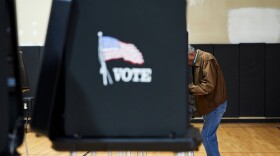A federal judge in Winston-Salem began hearing arguments Monday in a case challenging North Carolina’s new voting law. It is the second time U.S. District Judge Thomas Schroeder has presided over a trial involving the controversial legislation. This week’s arguments deal with whether it is constitutional to ask people to show photo identification in order to vote, along with how state officials are educating voters about the new law.
The state's Voter Outreach Team has three members. One of them is Jennifer Faulkner. She’s 32 years old and says she has been civically involved since she was about six or seven.
"I just really had a passion for getting people to vote, convincing people it was a civic duty, and helping to make that happen," she says.
Faulkner says her job is a way to get paid for something she was already doing. The state Voter Outreach Team was created by lawmakers when they wrote the new voting law in 2013. Faulkner’s job includes giving presentations to civic groups.
"We’ve had as few as three people show up and sometimes multiple hundreds," Faulkner says.
The group also makes it a point to give presentations to people who are least likely to have photo identification. Faulkner says that includes elderly, disabled, low-income and minority groups.
And it also means helping individual people. Faulkner says she recently helped an elderly woman from Rowan County who had never held photo identification.
"For me, it's about more of than the law. It's about helping people be competent members of society, and be able to have what they need," Faulkner says.
State officials say they’ve put out 300,000 flyers and 20,000 posters explaining a new law. They’ve also started airing spots on television and radio, urging people at the polls this year to bring "your passion, bring your individuality, bring your wisdom, and be sure to bring a photo ID."
The Voter Outreach Team also seeks partnerships with independent groups. These are non-partisan organizations trying to help people register and vote. But some of them believe the state’s education efforts don’t emphasize important details.
"Well, I'm about to give a presentation to an AARP group here in Raleigh, and I will try to make it clear," says Bob Hall, director of voter advocacy group Democracy North Carolina.
"You can vote with or without a North Carolina driver's license or other photo ID. The poll worker will ask for a photo ID, but if you don't have one, you can vote by giving the last four digits of your social security number and your birth date," Hall says.
Hall says the outcome of an election could change if voters are confused. He says he’s worried voters won’t show up or will run into problems with poll workers who aren’t adequately trained.
"We don't want people walking away feeling disenfranchised."
For an idea of whether the message is getting to people, I visited a few bus stops off of Capitol Boulevard.
There, I met Alicia Jenkins. She’s a registered voter, a student, and a technician at a medical lab. Like several others, she says she hasn’t heard of the new law. She doesn’t read the news.
"And I don't watch TV, unless it's cartoons with my kids," Jenkins adds. "When it comes to politics, I generally just listen to my godbrother and godmother and find out from them what’s going on."
Jenkins says there are plenty of things on her mind besides the mechanics of voting.
"I have to work, I have kids to take care of, and I have school. So, the last thing on my mind is voting."
Whether the message is that most voters will need an ID, or that people can vote with or without an ID, the challenge may be to get people to pay attention in the first place. The General Assembly has allocated $1 million per year to educate the state’s 6.5 million registered voters.










